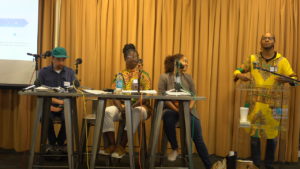Owning our workplace is key to building a healthy cooperative ecosystem. Let’s identify, build worker cooperatives, from service organizations to producers and support organizations that support each other.
Notes
- Most of the panel will be on worker cooperatives — how to identify and build organizations that transform the economy?
- How to reform laws & policies to create & sustain these institutions?
- E.g. Main Street Worker Employee Ownership Act
- Passed by Congress ~2 weeks ago
- Allow Small Business Administration (SBA) to provide technical assistance + access to capital to convert traditional businesses to worker co-ops (big barrier to cooperatives)
- Example of engaging / leveraging local & state policy to transform the economy
Presentations
Stacey Sutton
- We’re talking about an ecosystem
- Any business needs support (technical, institutional, financial, expertise)
- Worker cooperatives are particularly challenging from a governance perspective, and need support
- Why worker cooperatives?
- Worker cooperatives are autonomous businesses collectively owned & controlled by workers
- Typically, capital owns labor in a capitalist system
- Instead, labor should own capital — means of production are controlled by workers
- Other municipalities — creating & enabling environments for worker cooperatives
- Looked at 12 cities that are “cooperative cities” — municipal leaders investing in different ways in worker cooperatives
- Lots of attention in municipal government to support cooperatives
- 3 models / types:
- Top-down model relies on anchor institutions (e.g. hospital, educational institutions) for contracts, not the community, e.g. Cleveland, Richmond, VA; Rochester, NY
- Bottom-up cities, with history of community-driven expansion; Legislation, resolutions, support –> expansion in worker cooperatives; e.g. Philly, Oakland
- Cultivator cities — both top-down and bottom-up attention to worker cooperatives; building public awareness of cooperatives + putting capital into cities; e.g. NYC, Madison
- What are cities doing?
- Building blocks for scale
- Accelerate growth
- Legitimize & popularize
- What is Chicago doing???
- Cities are very competitive, and will do things if you show them a list of other cities doing cool things
- ==> CCEC = Chicagoland Cooperative Ecosystem Coalition
- Emerging (not fully formed yet)
- Bring in stakeholders that can provide important elements (e.g. tech assistance, cooperatives, etc.)
- Will formalize this coalition
- Received very very very small grant to host meetings of the coalition
- Presented resolution & policies to Cook County to support cooperatives
- Vision for next 3 years (pilot program)
- 7 things!
- Resources are siloed & not connected right now
- Emerging (not fully formed yet)
- Different elements:
- Technical assistance
- Building public awareness & worker / institutional awareness
- Research & policy
- Finance
- Education & training
- Commissioners on Social Innovation Committee are excited — right now, e.g. Chuy is supportive!
- Next step: two hall meeting on 10/17 @ 6pm-8:30pm; again, focus is on worker-owned cooperatives (not consumer cooperatives)
Eric Rodriguez
- Cooperation Chicago: Building Chicago’s Worker Cooperative Ecosystem (report)
- Same presentation given to county commissioners previously
- Turnout was decent, by the commissioner’s estimate / perception
- Worker centers = similar to unions in late 1800s, improving conditions, etc.
- Now applied to the “new economy” — temporary worker economy, not regulated (“the Wild West”)
- Legacy of slavery, E.g. domestic worker bill of rights — include these workers in labor rights, recognize them as workers!
- Sprung up around 2001 out of pure necessity, temp workers facing harassment, wage theft, etc.
- No one knew how to handle these situations, since who is the employer? staff agency? warehouses?
- Also, immigration intersection — undocumented workers
- Sectors: street vendors, temp agency, day laborers, domestic workers, restaurant workers, warehouse workers, taxi drivers
- How to sustain organizing work? needed to learn nonprofit game (foundations, grants, etc.). Talking in nonprofit industrial complex language to explain work to funders
- Many worker centers are successful, but hitting a limit
- Especially current climate questioning 501(c)(3) status of worker centers, maybe they should be unions
- But theory of change / tactic are different, e.g. using popular education
- Is this sustainable as a future? Worker centers don’t have dues like unions, and depend on grants — when you follow the trail, sometimes the funders are actually parties creating labor issues in America
- Domestic Worker & Day Laborer Center felt desire to be more self-sustained, independent; Explored worker cooperatives (e.g. Cafe Chicago, coffee cooperative housed by Dark Matter)
- White paper — building off work of others, putting the pieces together — partnership between Illinois Worker Cooperative Alliance + John Marshall Law School IWCA = lots of worker centers (including Eric’s)
- Worker cooperative definition = broadly defined (look in report for details)
- Scale:
- 350 cooperatives in the US
- 7K workforce
- $365M revenue
- Majority POC, women; These are often based in communities of color! Those communities are most affected by worker exploitation
- Recommendations — details in report
- Stakes = survival for these workers — 66% chance that day laborers aren’t paid what they originally negotiate

